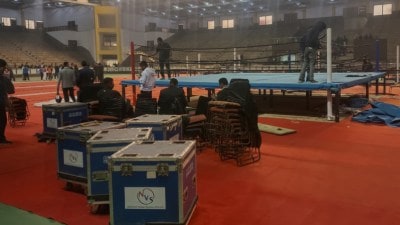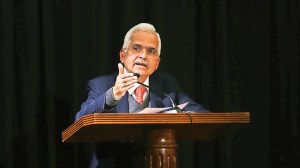Roving Eye 8212; Chandigarh
Nature NatterMore THAN women, it's trees that excite Khushwant Singh. Or so we discovered when the self-styled amoralist got carried away ab...

Nature Natter
More THAN women, it8217;s trees that excite Khushwant Singh. Or so we discovered when the self-styled amoralist got carried away about his pet subject at the opening of Worship the Tree 8230;8217;, a show of photographs by amateur shutterbug Ranjit Singh in the Capital But what really set the mood for the evening was the juxtaposition of poems by three Germans 8212; Bertolt Brecht, Erich Fried and Karl Krolow 8212; selected by Ranjit Singh8217;s wife, children8217;s fiction writer Jacquelin Singh, who read them out to an audience.
The sardarji took the opportunity to make an impassioned plea to protect the country8217;s green cover. 8220;So much wood is used when we cremate our dead,8221; he said, 8220;Nowhere do Hindu and Sikh scriptures say we should burn our dead. Many of our religious swamis and sants have been buried, not cremated.8221; He even suggested that Hindu and Sikh cemeteries be built outside city limits, with trees substituting for memorials. Of course, that had many in the audience wondering how the green sardarji proposed to find land for his design. But he had not had his say yet. 8220;Our tree-planting campaigns are failures because all that celebrities and politicians are interested in is seeing their picture in the papers,8221; he complained. 8220;The sapling is forgotten after that.8221; And not only does he feel that cutting trees be made a punishable crime, but he suggests students be awarded a graduation degree only after proving that they have planted and looked after five trees. A difficult proposition, yes, but not impossible.
A trainer8217;s tale
He has done it again, for the second time in a row.
Last year, a City dog trainer Shiv Kaushal bagged the Best Trainer Award at a dog show organised by the Bharat Kennel Club, in New Delhi, along with a dozen first prizes. This year again, he has won the best trainer award, but along with that his entries have also won all the first prizes 8211; two dozen of them. The show 8211; Twin National Obedience and Championship Dog Show 8211; was held at the Modern School, Barakhamba Road, New Delhi, on November 15. A total of 250 dogs were entered for the contest, with some of them coming from the southern states as well. The judges for the championship had come all the way from UK.
But, the show was Shiv8217;s from the very beginning. With six dogs, he managed to rule the entire twin championship. His entries included a Rotweiler pair, three Cocker Spaniels and a Labrador. While the Rotweilers 8211; Sparky and Finiza Sidhu- won thirteen awards in all, the Cockers- Tani, Roos and Honey 8211; won eight prizes. The Labrador, Nobel, also won two awards. The most obedient dog award went to Honey. And, of course, the best trainer award was won by Shiv himself. Incidentally, this is Shiv8217;s fifth best trainer award in two years. He won the first one in 1997 at the show organised by Chandigarh Kennel Club. Two other also came in the same year, one at the Northern India National Kennel Club and the other at the show held by New Delhi Kennel Club, in New Delhi. He then went on to win the same at the dog show organised by Chandigarh Kennel Club in the month of February. And the fifth one came on the 15th.
That8217;s Cricket
Cricket isn8217;t only about Sachin and Saurav, and no one believes in it more passionately than George Abraham, who has made cricket for the blind a global buzzword. And he has even got Madhavrao Scindia, former BCCI chief and cricket fanatic, on his side. 8220;There is not enough awareness in this country about the potential of the handicapped,8221; he said, announcing details of the first-ever Kanishka World Cup for blind cricketers, which takes off on Tuesday. 8220;Only if you aim high and dream big, can you get anywhere,8221; pitched in Abraham. This die-hard cricket fan, who didn8217;t allow his impaired vision to get in the way of his mission, firmly believes that the series will set a precedent in handicapped sports. We have no right to restrict the profile of any human being in our minds,8221; he says, pointing to the mental block most people have about the capabilities of the visually handicapped. If you aren8217;t convinced, take some time off to get your vision corrected.
One family, one theatre
Anyone who had been part of, or even peeping in at, the nine-day-long workshop cannot forget the sight of those bright youngsters learning, practising and performing together. The Chandigarh Institute of Performing Arts CIPA deserves all the praise for the venture, the Global Youth Theatre Workshop-cum-Festival, which went into the second year this time. There were students of art and theatre from Bulgaria, Czech Republic, Hungary, Yugoslavia and the region whose daily routine at the workshop began with a yoga session in the morning. It was really interesting to watch them learn the Sanskrit words which Suchitra Mitra drilled into them with accompanying expressions. What impressed an onlooker was the sincerity of approach with which the foreigners took down the notes. One of the girls did not know English and had her English-speaking companion translated the words into their own language.
But their vivacity was at its peak in the evening when the session was on Gatka, the martial art, and Bhangra. Under G S Khalsa, they learnt the difficult steps of Gatka with such an ease that gave the impression that they were born into this culture. And as for the vibrant Bhangra, Balkar Sidhu must have had the most satisfying time teaching the dance form to this bunch as their joyous jumps and shouts had an infectious spirit in them.
When the Mehndi festival came, all of them trooped off to the Sector 22 market and though the girls decorated their hands, the guys had mehndi patterns all over their arms and legs, some even on shoulder. The workshop was done in a systematic manner taking each aspect of theatre into account though the stress this time was on the dance forms in theatre. It is indeed an eye-opener to people who think that there is no culture in this part of the region. In fact there is lot, which those foreigners discovered in a matter of nine days and produced on the stage on the tenth day. We miss them now.
- 01
- 02
- 03
- 04
- 05































